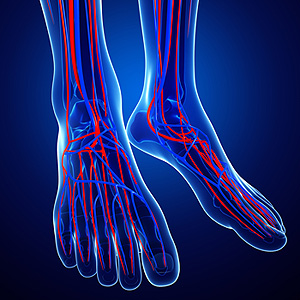
Common symptoms of poor circulation can include cold feet, a loss of feeling in the fingers and feet, and the skin may become discolored. When circulation is normal, the blood, oxygen and nutrients are transported freely through the blood vessels. Patients who have poor circulation have blood vessels that have become closed or hardened, causing the blood to move slower through these vessels. Additional symptoms of reduced or poor circulation can consist of weakened toenails, cracked skin, and existing wounds may heal slowly. This ailment can be indicative of underlying conditions. People who have Raynaud’s disease have limited blood flow to their extremities, which may be triggered by stress. Elevated glucose levels in diabetic patients may cause the arteries to narrow and blood vessels to become damaged, possibly leading to poor circulation. If you have any of these conditions, including a numbing sensation in your feet, it is suggested that you speak with a podiatrist who can effectively diagnose and treat poor circulation.
While poor circulation itself isn’t a condition; it is a symptom of another underlying health condition you may have. If you have any concerns with poor circulation in your feet contact one of our podiatrists of The Podiatry Center, PC. Our doctors will treat your foot and ankle needs.
Poor Circulation in the Feet
Peripheral artery disease (PAD) can potentially lead to poor circulation in the lower extremities. PAD is a condition that causes the blood vessels and arteries to narrow. In a linked condition called atherosclerosis, the arteries stiffen up due to a buildup of plaque in the arteries and blood vessels. These two conditions can cause a decrease in the amount of blood that flows to your extremities, therefore resulting in pain.
Symptoms
Some of the most common symptoms of poor circulation are:
- Numbness
- Tingling
- Throbbing or stinging pain in limbs
- Pain
- Muscle Cramps
Treatment for poor circulation often depends on the underlying condition that causes it. Methods for treatment may include insulin for diabetes, special exercise programs, surgery for varicose veins, or compression socks for swollen legs.
As always, see a podiatrist as he or she will assist in finding a regimen that suits you. A podiatrist can also prescribe you any needed medication.
If you have any questions, please feel free to contact our office located in Millburn, NJ . We offer the newest diagnostic and treatment technologies for all your foot care needs.
